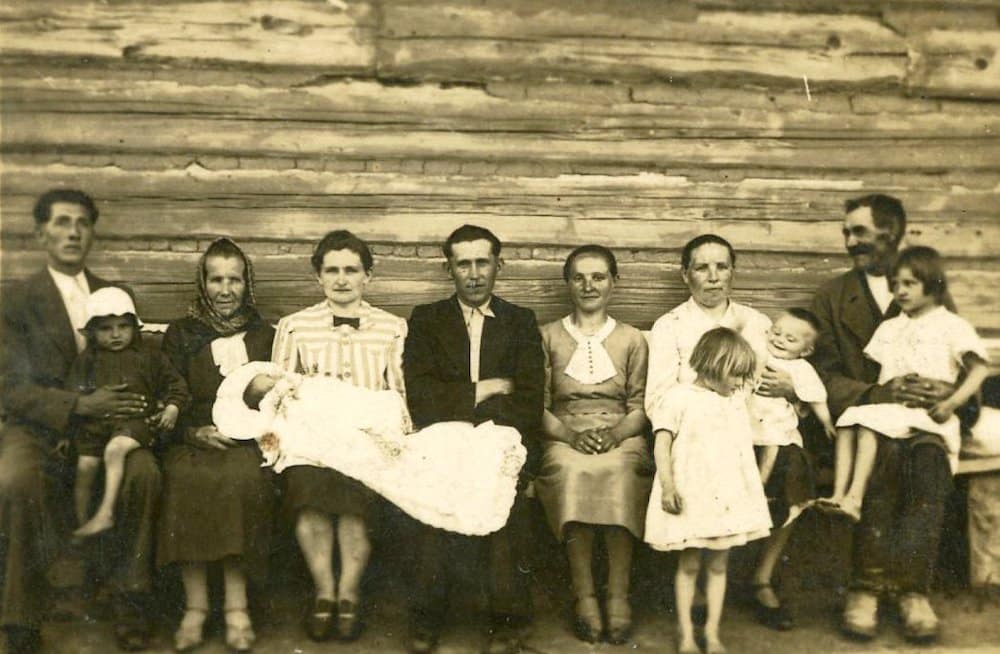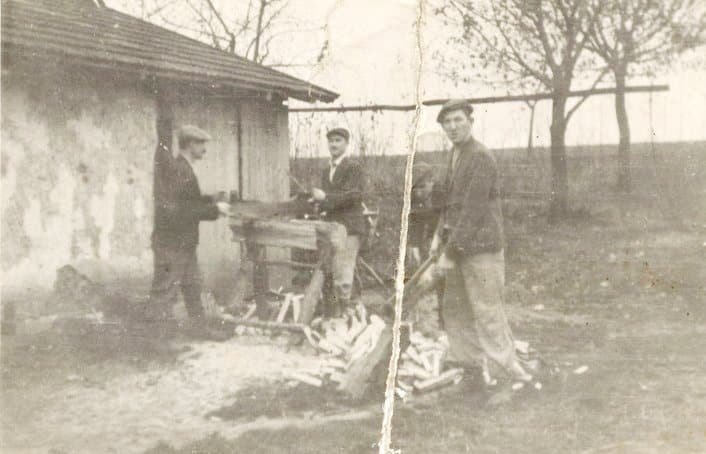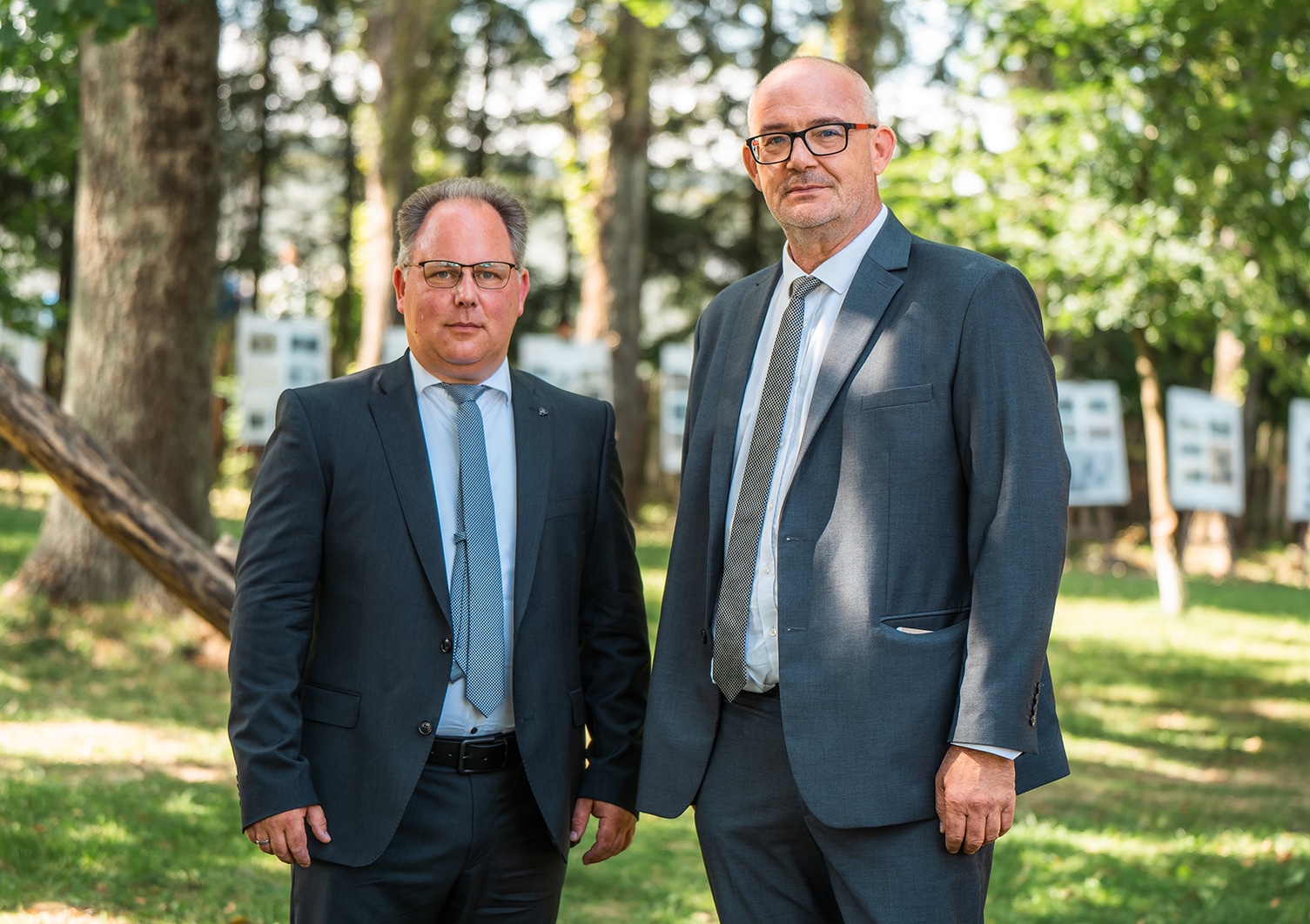(OSV News) — Until Polish film director Mariusz Pilis told him the story of the Ulma family in 2022, the mayor of the German city of Esens had no idea that the murderer of the newly beatified Poles who sheltered Jews lived unbothered in his town until his death in 1960.
Since finding out, Harald Hinrichs with his wife, Natascha, have participated in the beatification of the Ulma family, met with Markowa villagers in southeastern Poland and started a new chapter of the Polish-German local municipalities cooperation.
“I was very shocked because this story was not known at all in Esens,” Hinrichs told OSV News in Markowa, right after attending the Ulma family beatification Sept. 10.
“I only became aware of it through the interview request from Mariusz Pilis. … I was also very stunned about what happened here in Markowa,” he said.
The execution of the Ulmas
On March 24, 1944, Józef and Wiktoria Ulma with their seven children, including the one born during the execution, were shot by German Nazis, denounced by a gendarme that they were giving shelter to eight Jews in their house. The Jewish fugitives were shot first, then the entire Ulma family was killed. The man who ordered the killing and personally shot some of the victims, according to witnesses, was Eilert Dieken.
After the war, he still served in the German police unit and he was never tried for his crimes. He was buried at the municipal cemetery “remaining in the kind memory of family, neighbors and friends,” The Ulma Family Museum of Poles Saving Jews in World War II wrote on its website. Dieken’s family thought that he was a wartime hero.
When the Lancut state museum — the Ulma family museum did not yet exist in Markowa — approached Dieken’s daughter a decade ago to ask for information about her father, she sent back a letter in reply that shocked both historians and the Ulma film director.
“I was already filming my documentary about the Ulma family when a letter from Dieken’s daughter arrived to the state museum in Lancut — she was writing to the Polish museum that she is grateful the Polish state wants to honor her father,” Pilis said, noting that the woman knew nothing about the atrocities her father committed. That corresponded to the knowledge of the whole Esens community.
“I felt urged to take the documents to Germany, and show the full picture,” Pilis told OSV News. “I didn’t expect anything; honestly I expected no one to be interested in the topic.”
A new documentary
In the documentary, Hinrichs was truly surprised to learn about the horrific story of the Ulma family. He promised the director he’d learn more about the issue. He fulfilled his promise and, in October 2022, five months after the interview, visited Markowa for the first time.
“But he didn’t see the film until September, only a few days before the Ulma beatification, when he was a guest at our Berlin premiere,” Pilis said of Hinrichs. “I don’t think I will release a secret here saying that he was very nervous before the screening and was in tears after he saw the documentary.”
The German screening of “The Story of One Crime” took place in the Pilecki Institute in Berlin Sept. 5.
“I have to say, this film touches my heart. It tells the story of the Ulma family very vividly, and it also tells the political framework. … It also explains how people in Germany apparently often deal with history (of World War II), and I think it portrayed that very well,” Hinrichs told OSV News.
He felt it was his duty to come to the Ulma family beatification Sept. 10.

He said the first visit to Markowa in October 2022 made him realize “that the history of the Ulma family is of national importance in Poland,” and that “responsible was a person who lived in my town. And this is something that motivated me to come to Markowa today also for (the Ulma family) beatification.”
Representing Esens at the Ulmas’ beatification
“It is the duty for me, as a representative of my city, to participate in such an event. And I will also report about it at home, so that the history remains present in Esens as well,” he told OSV News.
With this story, Pilis said, the world of politics and journalism crossed in extraordinary ways.
“The end of the film shows that my role was much more than a role of a filmmaker and journalist, as I felt urged to act as a citizen of Poland and bring this story to a conclusion,” Pilis said. “I wanted to try to put together the pieces of the Polish and German parts of that story, so I invited the mayor of Esens to Markowa, and he accepted the invitation, which shows that in such painful matters, both sides need to take unprecedented steps,” he said.
Beginnings of new cooperation
For Hinrichs, two trips to Markowa were only the beginning of new cooperation between Poland and Germany.
“I will tell a lot in Esens, about Markova, about the Poles, about the Ulma family, about the film, about the beatification. And I will promote that the younger generation, that children and pupils and young people come here to Markowa. I will establish contacts in the museum of Markowa, so that we know from each other about the history,” he told OSV News.
Hinrichs wants to start a new relationship with the locals “so that this history is not lost. I think it is very important that Poles and Germans come to a better, trusting relationship.”
A day after the beatification, on Sept. 11, Hinrichs met with the villagers in Markowa.
“For the 80th anniversary of the Ulma murder in March 2024, a bigger delegation from Esens is expected in Markowa, that I can say already now,” Pilis said.
“I hope this is only the beginning of a constant cooperation which shows that when standing up to the truth, and looking each other deeply in the eye, we can treat each other as partners,” Pilis said.
Preserving the past for the future
The other German gendarme who pulled the trigger in the Ulma house, Josef Kokot, was tried by the Polish court, found guilty and sentenced to death (a penalty later exchanged for life behind bars,) and died in prison in Poland in 1980. He shouted when shooting the Ulmas: “This is how Polish pigs that hide Jews die.”

“The Ulma family had to die because they helped other people. And it doesn’t matter at all whether they were Jews or whether they were Polish citizens. They helped others and died because the Germans oppressed them,” Hinrichs told OSV News.
“This must never be repeated. I think the Ulma family is a very good example of what Polish citizens did during World War II for the protection of other people. That cannot be credited highly enough. And in this respect, we must always bow down to this achievement,” he said.
“Without a spark from one side, there would be no fire in this story. At some point, we have to get out of our historical comfort zones,” Pilis said of an extraordinary outcome of his film.
“I am fully aware that this story, the Ulma family story was, to say it very illustratively, was dug out of the grave,” he said.
The truth always wins
“To see the whole Ulma family beatified is to me a sign that truth always wins, that it can embed itself deeply in modern life, and on a professional side is a demonstration to me that it is worth the sacrifice, that it is worth documenting such things,” Pilis said.
He added that “The fact that it was possible to connect the two ends of the German and Polish side of the Ulma story is a reward from heaven because it did not have to happen.”
Hinrichs added that Poles and Germans need to work together “so that history does not repeat itself,” adding that the difficult past also needs to be preserved “for the future.”





